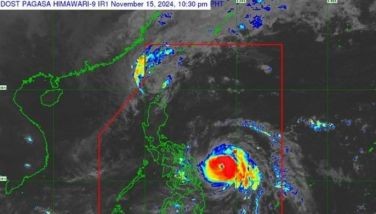`Gov't committed irreparable blunders with MNLF pacts'
KIDAPAWAN, North Cotabato -- Sen. Juan Ponce Enrile said the government had committed "irreparable blunders" when it signed with the Moro National Liberation Front (MNLF) the Tripoli accord and the 1996 peace agreement to expand the coverage of the Autonomous Region in Muslim Mindanao (ARMM).
Speaking before a group of Christian leaders in Cotabato City the other night, the senator said the Tripoli accord during the Marcos administration and the Sept. 2,1996 peace agreement signed by then President Fidel Ramos have practically tied the hands of Congress in the deliberations to amend the Organic Act of Mindanao.
Enrile was in Cotabato City with Senators Aquilino Pimentel, Juan Flavier, Rodolfo Biazon and Franklin Drilon for the second leg of consultations with the people of 14 provinces and nine cities covered by the proposed autonomy expansion.
"The government committed two blunders, and it will take a lot of thinking on our part to find a solution," Enrile said.
He explained that the Tripoli agreement brokered by Libyan President Muamar Ghadafi has practically dismembered the country while the 1996 peace agreement, or the so-called Jakarta accord, has created a constitutional dilemma which the Senate must try to resolve.
While the government has complied with the constitutional provision to set up ARMM, the problem arose when an agreement was entered into with the MNLF for the expansion of the existing region.
One of the gray areas is the plebiscite participation of provinces, particularly those that have already approved or rejected their membership in ARMM.
The MNLF has insisted that four provinces that voted "yes" in the 1989 plebiscite should no longer be allowed to vote in a new one because they have already opted to become members of the region. These four provinces are Maguindanao, Sulu, Lanao del Sur and Tawi-Tawi.
The same principle is being espoused by Christian-dominated areas like Zamboanga City and Cotabato City, which have already decided not to be part of ARMM.
In Muslim-dominated areas like Sulu, however, local officials still want to participate in another plebiscite so that they can campaign for "no" and get out of ARMM -- a move that some political observers claim may trigger hostilities between rival factions.
Pimentel, chairman of the Senate committee on local government, said the result of consultations will serve as the basis of a new law for the holding of a plebiscite to decide on ARMM's expansion.
"In the end it will be the people that will prevail. We will craft a new Organic Law in accordance with the wishes of the majority," he said.
- Latest
- Trending


























